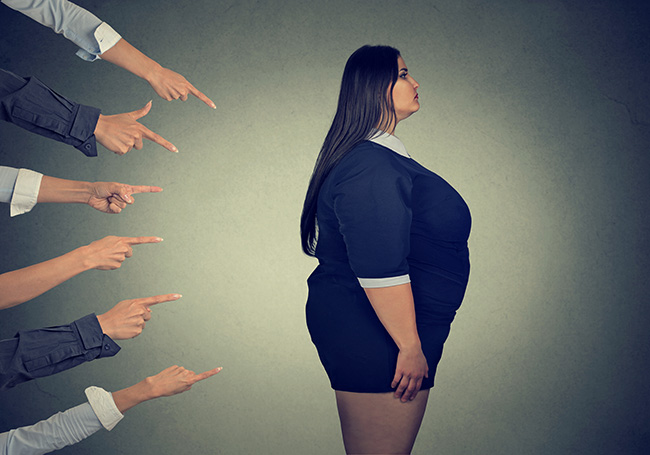
The researchers found that implicit and explicit attitudes on the basis of sexuality, race, skin tone, age, and disability all remained the same or improved (showing a decrease in bias), while implicit bias on the basis of body weight increased 15 percent in less than a decade. Bias against fat people isn’t on the way out—it’s on the rise.1, 2
People come in a variety of shapes and sizes, but socially accepted beauty standards and moralized notions of health dictate whose body is acceptable and deserving of respect. Bodies that exist outside certain medical parameters, such as fat bodies, are often faced with significantly poorer healthcare options and outcomes largely due to stigma and a lack of accommodating equipment.3 Being part of this group myself, I am most comfortable with the term fat (as a neutral, descriptive term) and will be using it for the purposes of this article.
In addition to medical and social barriers, the workplace can be fraught with anti-fat bias. Workplace programs that encourage diet culture aligned behaviors, such as weight loss challenges, still seem to sneak their way into offices and can exacerbate sexism and trigger those who struggle with eating disorders.4 Despite statistics that show fat individuals are more likely to be fired, passed up for a job, and paid less,5 Michigan is the only state in the U.S. to explicitly protect against weight discrimination.6 Since healthcare is tied to employment in the U.S., barriers to health insurance create an additional roadblock to quality healthcare for the fat community.
In medical settings, fat patients are given less time and are perceived by doctors as being noncompliant.7, 8 As countless blogs, articles, and social media posts from people with diverse bodies will attest, it is nearly impossible to find medical care for the flu, an ankle sprain, allergies, or other conditions unrelated to weight without receiving a lecture about weight loss.9 In my own experience (and for many others who have written on the subject or who I have spoken to), this persistent negative attitude and repeated pattern of shame in medical settings is traumatic and leads to avoidance in seeking medical care at all. Nevertheless, there is still no evidence to show that a safe and permanent method of weight loss exists.10, 11 While modern research on long-term weight loss seems a bit murky, several studies show that weight loss tends to be unsustainable or to cause weight regain.12, 13, 14, 15
Cruelty toward fat individuals permeates familial and romantic relationships as well.16, 17 Today, many people grow up with parents who model body scrutiny and insecurity, but those of us who are fat also tend to experience direct, personal attacks on our bodies. I have had to confront my own internalized anti-fat bias while encountering various levels of that internalization in others, which suggests that this phenomenon is potentially rampant, and this makes it feel nearly impossible to organize and fight for improvements in society. Additionally, fat people are often discredited in their accounts of injustice; unconscious bias prevents potential allies from comprehending their own stigma.
Weight is often considered to be a choice despite burgeoning research on the genetic components involved,18, 19 and this perception increases harsh attitudes and alienates the fat community from the greater social justice movement.20 Though the roots of fatphobia can be traced to a long racist history of othering certain bodies,21 the topic still seems disconnected from advocacy and justice conversations.22 Nevertheless, allyship is imperative for this community.
I recently attended a book club meeting to discuss a new book by Aubrey Gordon, a fat activist who previously had an anonymous online presence known as Your Fat Friend. Her book, titled What We Don’t Talk About When We Talk About Fat, explores personal and shared experiences of systemic anti-fatness. Some of the book club attendees remarked on how citation-heavy and research-like her book was, and it forced me to reflect more on this blog and its construction. It seems I was drawn to the same method, hyperlinking terms and citing resources with abandon. While part of that may reflect my background in writing and editing, this intimate book club conversation made me realize that my motive may have been akin to Aubrey’s—seeking support in these convictions that are so often invalidated. While all the resources included in this piece merely skim the surface, with all the convenience that entails, will you take this opportunity to learn more?
Sources
- https://www.self.com
- https://journals.sagepub.com
- https://www.scientificamerican.com
- https://www.forbes.com
- https://www.reuters.com
- https://time.com
- https://highline.huffingtonpost.com
- https://pubmed.ncbi.nlm.nih.gov
- https://www.nytimes.com
- https://www.goodhousekeeping.com
- https://psycnet.apa.org
- https://ajph.aphapublications.org
- https://newsroom.ucla.edu
- https://pubmed.ncbi.nlm.nih.gov
- https://pubmed.ncbi.nlm.nih.gov
- https://highline.huffingtonpost.com
- https://opencommons.uconn.edu
- https://pubmed.ncbi.nlm.nih.gov
- https://www.ncbi.nlm.nih.gov
- https://www.yesmagazine.org
- https://www.sabrinastrings.com
- https://www.anthropology-news.org
Do you have a story idea for us? Do you want to submit a guest blog? If it's about equity, diversity, or inclusion, please submit to edi.stories@nih.gov.
For news, updates, and videos, subscribe or follow EDI on: Twitter, Instagram, Blog, YouTube.






